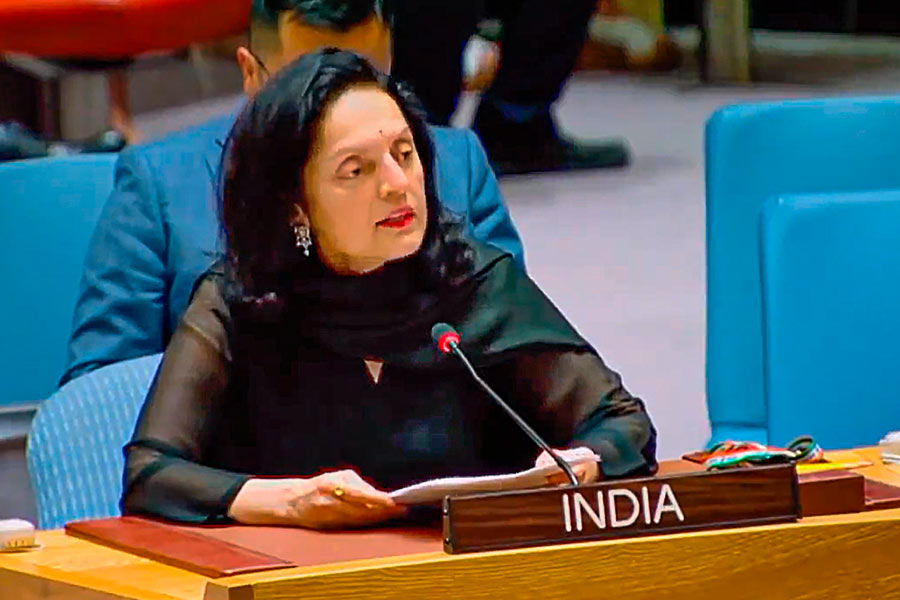India has welcomed the release of Israeli hostages by Hamas and called for the immediate and unconditional release of those still held in captivity by the militant group, asserting that there can be no justifications for terrorism and hostage-taking.
Last week, an agreement was reached by Israel and Hamas, with the mediation of Qatar supported by Egypt and the United States, to release Israeli and other foreign nationals taken as hostages by Hamas during the October 7 attacks. About 1,200 people were killed in the attack and 240 Israelis and other nationals were taken hostage by Hamas.
So far, over 60 Israeli and foreign nationals have been released by Hamas in five groups and Israel has in return freed about 150 Palestinian prisoners.
“We are gathered today at a time when the security situation in the Middle East is deteriorating due to the ongoing Israel-Hamas conflict, with large-scale loss of civilian lives, especially women and children and an alarming humanitarian crisis. This is clearly unacceptable and we have indeed strongly condemned the death of civilians,” India’s Permanent Representative to the UN Ambassador Ruchira Kamboj said on Tuesday.
In her remarks to the UN General Assembly plenary meeting on ‘Question of Palestine and the Situation in the Middle East’, Kamboj said that in addressing this humanitarian crisis, it is necessary for all parties to display utmost responsibility.
“We are aware that the immediate trigger was the terror attacks in Israel on October 7, which were shocking and deserve our unequivocal condemnation. There can be no justification for terrorism and hostage-taking,” she said.
Kamboj said India welcomes the news of the release of the hostages, and also calls for the immediate and unconditional release of the remaining hostages, underlining that the country’s thoughts are with those who have been taken as hostages.
“India has a zero-tolerance approach to terrorism. We also believe that there is a universal obligation to observe international humanitarian law,” she said.
UN Secretary-General Antonio Guterres has welcomed the release of hostages and renewed his call for the immediate and unconditional release of all hostages.
During a press conference on Tuesday, Guterres said the truce in the conflict was a step in the right direction and a "symbol of hope. But it doesn't solve the key problems we face. That is why we have been insisting on the need for a humanitarian ceasefire, leading to the unconditional and the immediate release of all hostages and to the possibility to have effective humanitarian aid to all people in Gaza, wherever they live." Kamboj said that India welcomes all efforts by the international community that would lead to a de-escalation and delivery of humanitarian assistance to the people of Palestine.
Kamboj further termed the humanitarian pauses in the Israel-Hamas conflict as a "welcome step” to ensure the timely and continuous delivery of humanitarian aid. India has sent 70 tonnes of humanitarian goods including 16.5 tonnes of medicines and medical supplies.
Since a humanitarian pause in the conflict went into effect on November 24, the United Nations has scaled up the entry of aid into Gaza and sent aid to some northern areas that have been largely cut off for weeks. Guterres has noted that this aid barely registers against the huge needs of 1.7 million displaced people.
“The humanitarian catastrophe in Gaza is getting worse by the day,” a statement issued by his spokesperson has said.
Kamboj told the plenary meeting that since the start of the conflict, Prime Minister Narendra Modi and External Affairs Minister S Jaishankar have been in close contact with leaders of the region and beyond, where they have emphasised a consistent message “that it is important to prevent escalation, ensure continued delivery of humanitarian aid and work towards an early restoration of peace and stability.” She said that along with restraint, the Indian leaders have also emphasised a peaceful resolution of the conflict through dialogue and diplomacy.
As the International Day of Solidarity with the Palestinian People is marked on November 29, Kamboj reaffirmed India’s long-standing relationship with the Palestinian people, based on deep-rooted historical and people-to-people ties, and Delhi’s consistent support to the people of Palestine in their endeavour for statehood, peace and prosperity.
She underlined that India urges the parties to work towards creating conditions necessary for peace and the restarting of direct negotiations between the parties, including through eschewing violence and de-escalation.
“India has always supported a negotiated two-state solution to the Israel-Palestine issue leading to the establishment of a sovereign, independent and viable State of Palestine living within secure and recognised borders, side-by-side in peace with Israel,” she said, reaffirming India’s firm commitment to achieving a just, peaceful and lasting solution to the Israel-Palestine issue.
“We firmly believe that only a two-state solution, achieved through direct and meaningful negotiations between both sides on final status issues, will deliver an enduring peace that the people of Israel and Palestine desire and deserve,” she said.
Kamboj reiterated India’s continued support to the Palestinian people through the bilateral development partnership which covers a wide range of sectors including health, education, women’s empowerment, entrepreneurship and information technology, and said Delhi will also continue to send humanitarian assistance to the people of Palestine.
The UN Chief has stressed that the dialogue that led to the agreement must continue, resulting in a full humanitarian ceasefire, for the benefit of the people of Gaza, Israel and the wider region.
He has urged all States to use their influence to end the “tragic conflict” and support “irreversible” steps towards the only sustainable future for the region: a two-state solution, with Israel and Palestine living side by side, in peace and security.
Except for the headline, this story has not been edited by The Telegraph Online staff and has been published from a syndicated feed.










